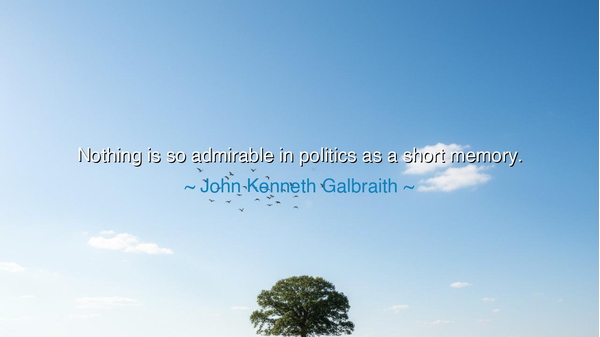
Nothing is so admirable in politics as a short memory.






O children of the future, heed the wisdom of John Kenneth Galbraith, whose words ring with the clarity of ancient truths: "Nothing is so admirable in politics as a short memory." In these words lies a truth that the wisest rulers of old understood—the ability to forget past grievances, failures, and slights is often the mark of a shrewd and effective leader. In the heat of political life, the mind must be clear of past distractions to move forward with strength and vision. To hold on to the weight of past conflicts is to be bogged down by the ghosts of history, preventing a leader from making bold, decisive moves for the future.
In the ancient world, the Roman Republic was a place where politicians constantly battled for power, yet Cicero and other great figures knew that the key to survival in such a world was the ability to forgive and forget. They understood that to hold grudges against one's rivals was to invite weakness and inaction. Cicero, though an eloquent and often divisive figure, was able to pivot in his strategies, adapting to the ever-changing political landscape. His ability to rise above past conflicts and move forward allowed him to leave his mark on history, while others, consumed by their own bitterness, faded into obscurity.
Similarly, Alexander the Great, though famed for his military genius, also knew the power of a short memory. When he conquered vast territories, he often forgave the leaders of the cities he conquered, allowing them to retain power under his rule. His ability to quickly forgive those who had once opposed him ensured that his empire thrived without the weight of resentment. His vision of uniting East and West was not clouded by the past but was driven by the possibility of a unified world. His short memory in politics was not a sign of weakness, but of the strength needed to achieve greatness.
In modern times, we see the same principle play out in the careers of leaders who understand that the future cannot be shaped by the weight of past mistakes. Consider the example of Abraham Lincoln, who, despite the divisions of the Civil War, sought to bring the nation together rather than perpetuate old conflicts. His famous words in his second inaugural address, "With malice toward none, with charity for all," were not just lofty ideals, but a practical acknowledgment that a short memory is essential in politics—healing requires the courage to move forward, not to dwell on the wounds of the past.
O children, let the wisdom of Galbraith and the ancients guide you. In the political realm, to forget is not to be weak, but to be wise. For a leader, the ability to cast aside the weight of past grudges, failures, and betrayals is a gift that allows them to forge a new path. The greatest leaders, from Alexander to Lincoln, understood that a short memory is the key to a bright future. May you too, in your journey through life, learn the power of forgiveness and letting go, so that you may always move forward with strength and clarity, unburdened by the chains of the past.






Lluan
This quote makes me think about how the public seems to forgive and forget the mistakes of politicians far too easily. While short-term memory may be beneficial for political survival, does it mean we’re not demanding enough of our leaders? Can politics function without reflection on the past, or do we risk repeating the same errors over and over again? Shouldn’t there be more value placed on accountability and long-term planning?
HCHuyen Chi
Galbraith’s perspective on short memory in politics is thought-provoking. If politicians only focus on the present and future, is it possible that they’re ignoring the lessons of the past? Can a short memory allow for better decision-making, or does it just breed a lack of responsibility and continuity? Is there a way to balance the need for fresh perspectives with the importance of learning from history in the political arena?
MTNguyen Manh Tien
It’s a bit unsettling to think about how, in politics, a short memory could actually be seen as a virtue. It suggests that the past, with all its mistakes and missteps, is quickly discarded in favor of new agendas. But does this approach contribute to the constant cycle of broken promises and failed policies? Should we expect more from our political leaders in terms of long-term memory and accountability?
UNUyen Nguyen
I find this quote from Galbraith quite cynical, yet it’s undeniably true in some respects. Politics often feels like it’s built on the ability to forget the past in order to move forward, especially when it comes to elections. Does this short memory serve the political system, or is it a dangerous trend? Shouldn’t politicians be more accountable for their past actions instead of relying on public amnesia to move forward?
Ppxthanhhien
This quote by Galbraith raises an interesting point. In politics, it seems like politicians are constantly moving from one issue to the next, often with little regard for past failures or successes. But is this ability to forget beneficial in allowing politicians to focus on the future? Or does it mean they’re doomed to repeat past mistakes? How much should we, as citizens, hold them accountable for their actions over time?